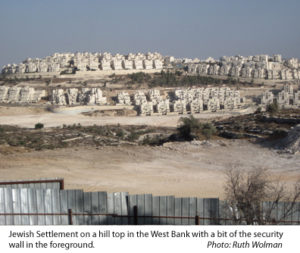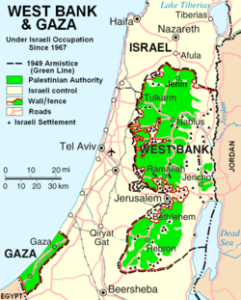A(nother) cease fire has been brokered between Israel and Gaza. The Egyptian FM made a formal announcement of a truce in a joint press conference with U.S. Secretary of State Hillary Clinton and Israel agreed to it. On the eve of the cease fire between Israel and Gaza, let’s glance at the current situation. Take into account that the state of Israel is roughly half the size of Lake Michigan. Its population is roughly half the size of the New York metropolitan area. Despite being a Jewish state, more than twenty percent of its residents are Arab and most Jews in Israel describe themselves as secular rather than religious.
Israeli Prime Minister, Benjamin Netanyahu authorized the first strike against the Gaza Strip’s ruling Hamas militant group. They did this in response to days of attacks out of Gaza. Since a previous offensive four years ago, Hamas has restocked its arsenal with more sophisticated and powerful weapons. They seized control of the Strip, a densely populated area five years ago from the Fatah movement of Palestinian President Mahmoud Abbas. (See “Post #4” article on this site) Hamas is a militant group sworn to Israel’s destruction and their weapons can now target near half of Israel’s population. Both sides have fired many hundreds of rockets and some missles.Below is a map of Israel’s enemies, 22 of them.
The Palestinian Arabs believe that land belongs to them. The original problem with Palestine was a political and national one over a territorial objective. They have not wavered in their demands for a 2-state solution, one that Israel will not accept. They continue to call for recognition and additional land. The initial conflict is biblical, reaching back to the story of Abraham, Sarah and Ishmael, his son by Hagar, Sarah’s maid servant (Genesis 16). According to the story, Sarah had Hagar and Ishmael sent away into the desert. The Arabs are the modern day descendants of Ishmael, who was promised by God to become a great nation. Before Israel became a nation, the people of the area lived quietly together, basically ignoring one another. But after Israel gained its autonomy, hatred and revenge has become the order of the times and these ancient hatreds still seethe today.
Palestinian militants claim they are resisting Israeli occupation of the territory. Israel withdrew from Gaza in 2005 but has maintained a blockade of the territory, in order to prevent arms smuggling. This didn’t prevent the Gaza War of 2008-9 when Israel rebelled against smuggling activities from Gaza and even began a ground war. The conflict lasted 3 weeks. Many conflicts of this sort have occurred since 1948 when Israel gained statehood.
Of course, prolonged fighting carries great risks for both sides – many civilians dead, constant unrest and uncertainty about future attacks, possible ground offensive, psychological damage, property damage, possibility of problems with Iran and the other Middle East countries allied to destroy Israel and claim its land. Then there is the Muslim Brotherhood, a true cancer of freedom, already overtaking much of that area’s cleric authority and mindset. It is a situation that will escalate, no one can predict the outcome.

The current conflict reminds one of the many in Israel’s past. The roots of the modern Arab-Israeli conflict lies in the rise of Zionism and the creation of Israel as a state in 1948. Israel fought against Palestinian Arab forces including Egypt, Lebanon, Syria, Jordan and Iraq in the War of Independence at that time and they have been at each other multiple times in the years since then. At this time Jordan controls the West Bank, Egypt controls the Gaza Strip and the Palestinians, there are Jewish settlements in the Occupied Palestinian Territory, and the ongoing struggle between them that began more than 100 years ago still rages. Many attempts have been made to broker a two-state solution, involving the creation of an independent Palestinian state alongside an independent Jewish state or next to the State of Israel have failed. The biblical land of Canaan has been under siege throughout history, occupied or controlled by twenty different nations and rulers.
Zionism has several different meanings:
1.It is an idealogy – Zionist ideology holds that the Jews are a people or nation like any other, and should gather together in a single homeland.
2.A descriptive term – The term “Zionism” was apparently coined in 1891 by the Austrian publicist Nathan Birnbaum, to describe the new ideology. It is also used to describe anyone who believes Jews should return to their ancient homeland.
3.A political movement – The Zionist movement was founded by Theodor Herzl in 1897, incorporating the ideas of early thinkers as well as the organization built by Hovevei Tziyon (“lovers of Zion”). (www.mideastweb.org)
Israel does not have a written constitution, even though according to the Proclamation of Independence a constituent assembly should have prepared a constitution by October 1, 1948. The delay in the preparation of a constitution resulted primarily from problems that emerged against the background of the alleged clash between a secular constitution and the Halacha (the Jewish religious law). One of their problems in drafting the document centered on the reference to the word “God”. “For the secularist, anti-religious left that was still very powerful in 1948, any mention of Divine providence was anathema.

For religious Jews and those perhaps not so personally observant but still anchored within the framework of Jewish tradition, the proclamation of the reestablishment of the Jewish state could not appear without such a reference. The compromise worked out was built around the inclusion of Tzur Israel (Rock of Israel), a phrase traditionally used as a euphemism for God, yet vague enough to allow for various interpretations. Since then, the tension between secular and religious has taken various turns but it remains fundamental to almost every aspect of Israeli politics.” (jcpa.org).
See “Concise Timeline of Recent Israeli-Palestinian History” and many other aspects of this conflict, including biographies of Israeli leaders, the Hamas, Al-Qaeda, and Arabia. Click on http://www.mideastweb.org/timeline.htm
Next time: Spiritual implications, warnings and End Of Days scenario for Israel. Does God want Israel to triumph? Can there be an end to hatred between these countries?
Contact Marlena: [email protected]


